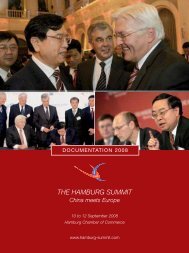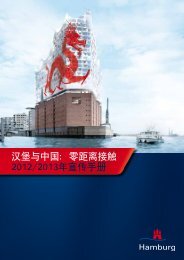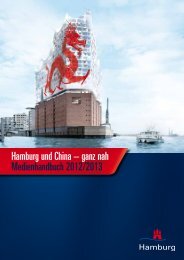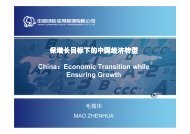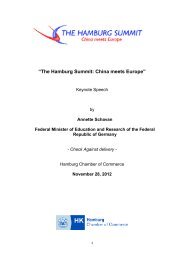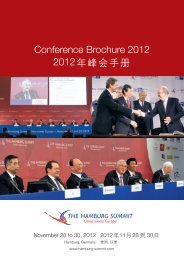Documentation Brochure - Hamburg Summit
Documentation Brochure - Hamburg Summit
Documentation Brochure - Hamburg Summit
- No tags were found...
You also want an ePaper? Increase the reach of your titles
YUMPU automatically turns print PDFs into web optimized ePapers that Google loves.
A Bridge for Knowledge and Skills<br />
China´s Prime Minister Wen Jiabao gives his opening speech at <strong>Hamburg</strong>´s City Hall<br />
The visit of Wen Jiabao, Prime<br />
Minister of the People’s Republic of<br />
China, was the highlight at the beginning<br />
of the conference. Many participants<br />
considered his address as<br />
frank and ground-breaking. Wen began<br />
his speech by stating that “since its<br />
inception the <strong>Summit</strong> has played<br />
an important role in enhancing<br />
cooperation and friendship between<br />
China and the European Union.” And he<br />
continued: “China’s relations with<br />
Europe are the best among relations<br />
with countries, they are stronger than<br />
ever before. If one compares China-EU<br />
relations with a huge ship in the ocean,<br />
the business community would be its<br />
powerful engine.”<br />
In his speech Wen wanted to make a<br />
number of points clear “to help you<br />
better appreciate developments in<br />
China.” He first assured the audience<br />
that China would continue to pursue<br />
the path of peaceful development. In<br />
this process the Chinese government<br />
pursued “a strategy of opening up for<br />
mutual benefit that will bring more<br />
opportunities to the world.” Wen cited a<br />
number of figures to illustrate the<br />
benefits of this policy. “Since its accession<br />
to the World Trade Organisation in<br />
2001,” he mentioned, “China’s annual<br />
imports have averaged about 500 billion<br />
US $, creating nearly 10 million<br />
jobs for the exporting countries and<br />
regions.” The will to open up and eliminate<br />
trade barriers must, however, be in<br />
evidence among all partners, Wen said.<br />
“We call on all countries to open<br />
markets, lift restrictions on technology<br />
exports, boost international investment<br />
and establish an international multilateral<br />
trading system that is open,<br />
fair, reasonable, transparent and nondiscriminatory.”<br />
Naturally, he also commented on the<br />
extremely important energy issue.<br />
“China,” he said, “is a major energy<br />
consumer, but more importantly it is a<br />
major energy producer. Two thirds of its<br />
hydroelectric power potential remain<br />
untapped, and the development of<br />
nuclear, wind and biomass power has<br />
just begun.” In 2005 the Chinese<br />
government had framed a clear target:<br />
“Our goal is to build a stable, economical<br />
and clean energy supply system.”<br />
Wen also dealt with a topic that<br />
dominated many discussions at the<br />
<strong>Hamburg</strong> <strong>Summit</strong>: the importance of<br />
protecting intellectual property rights<br />
and IPR holders’ interests. “To us in<br />
China,” he explained, “protecting IPR is<br />
both an international obligation and a<br />
requirement for promoting China’s own<br />
development and enhancing its capacity<br />
for independent innovation.” He left no<br />
doubt as to what must be done: “We<br />
must make sure that steps taken in<br />
China to protect IPR are as hard as<br />
steel.”<br />
Wen described by way of an anecdote<br />
what is necessary to make relations<br />
successful and profitable for both sides.<br />
Gottfried Wilhelm Leibniz had stated<br />
that a bridge for exchanging knowledge<br />
and skills needed to be built. “Today, 300<br />
years later,” Wen said, “China and<br />
Europe are in need all the more of a<br />
bridge of this kind.”



